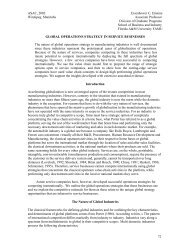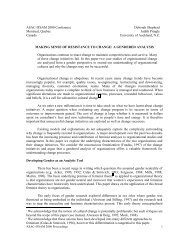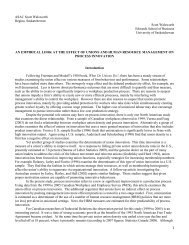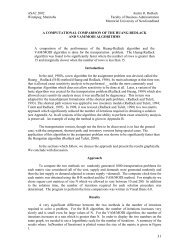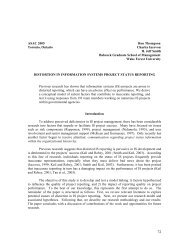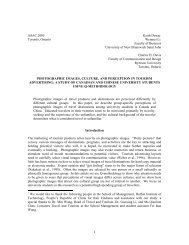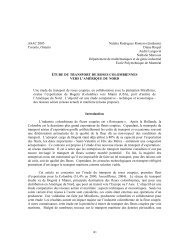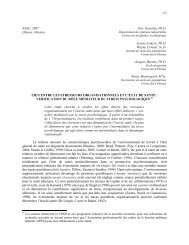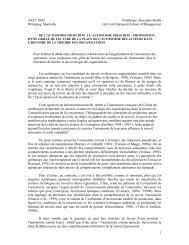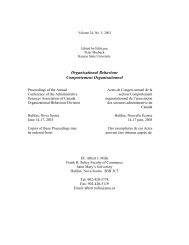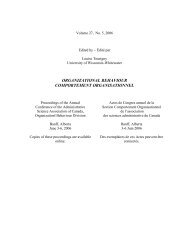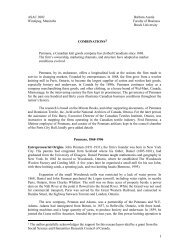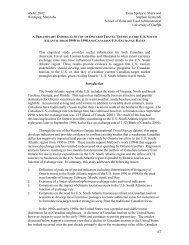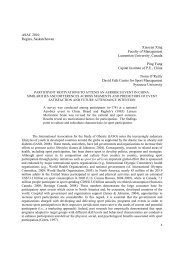ASAC 2005
ASAC 2005
ASAC 2005
You also want an ePaper? Increase the reach of your titles
YUMPU automatically turns print PDFs into web optimized ePapers that Google loves.
<strong>ASAC</strong> <strong>2005</strong><br />
Toronto, Ontario<br />
Avner Levin<br />
Mary Jo Nicholson<br />
Faculty of Business<br />
Ryerson University<br />
PRIVACY PROTECTION AND HEALTH MANAGEMENT: A CONTRADICTION IN<br />
TERMS<br />
Summary<br />
What do people value more – their privacy, or their health The province of Ontario has<br />
recently passed legislation that attempts to answer this question, at least for its residents. The<br />
Personal Health Information Protection Act (PHIPA) recognizes that most individuals would<br />
prefer not to sacrifice one at the expense of the other, and at the same time that such sacrifices are<br />
inevitable. It sets out therefore to perform a delicate balancing act, and time will tell its degree of<br />
success. There are of course many stakeholders in the health-care sector that cannot afford to wait<br />
for history’s judgement. Charged (at least up until now, primarily) with the task of providing<br />
efficient, high-quality health-care they wonder how compatible their old responsibilities are with<br />
their new obligations as laid out by PHIPA.<br />
We do not presume in this paper to attempt to answer such concerns. What we will<br />
attempt is to offer a contrast, useful we hope to health-care managers, between the path Ontario<br />
(and more generally Canada) has chosen to follow, and the path down which the U.S. seems to be<br />
headed when balancing health-care and privacy. Reconciling privacy protection and health-care<br />
management is a particularly difficult exercise from the American point of view, due, not only to<br />
the private management of health care, but also due to the prevailing conception of privacy<br />
protection in the U.S. which tends to focus on protection of individuals from government, and<br />
less on their protection from the activities of the private sector.<br />
Accordingly, this paper is divided into a number of sections. The first surveys the<br />
legislative framework for the protection of health information privacy in Canada, emphasizing<br />
Ontario. The second similarly surveys the U.S. The third discusses briefly Australia’s approach to<br />
health information privacy protection. Australia’s health-care system, which allows residents to<br />
choose between public and private health care is significant not only as a possible future for<br />
Canadian health care, but also because of the Australian push to completely digitize its health<br />
information, a move that may create unique privacy considerations.<br />
We find, as the paper will reveal, that the legislated privacy protection of health<br />
information is a ‘mess’, regardless of the jurisdiction surveyed. There are many purported reasons<br />
for this legislative state of affairs, but within the scope of this paper we will focus on one of them<br />
– that the protection of privacy, and the provision of health care, are largely incompatible social<br />
constructs, to the point that they are almost mutually conceptually exclusive. This paper’s fourth<br />
section is devoted therefore to the conceptual examination of privacy, and to a lesser degree,<br />
health-care. Finally, we point out the implications of such a conceptual incompatibility to healthcare<br />
managers. If our understanding of health information privacy is correct then health-care<br />
65
managers are indeed caught between the rock of providing quality health care and the hard place<br />
of personal information protection.<br />
66



